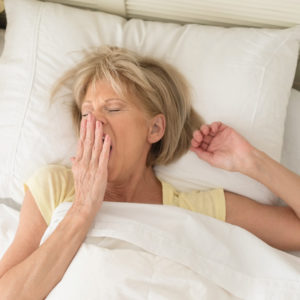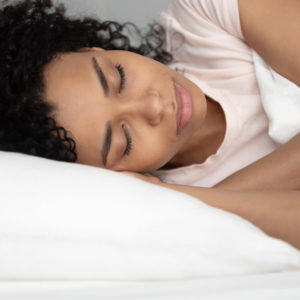Sufficient Sleep & Gut Health
Sufficient Sleep is Important.
We all know that sufficient sleep is important. But when seasons of life get busy, it’s often the first thing to go.
Sleep is critical to the health of the human body. During sleep, the body is able to perform countless processes from tissue recovery to neural processing. Both physical and mental health benefits greatly from sufficient rest and recovery. Let’s take a closer look at the governor of sleep: the circadian rhythm.

Sleep Circadian Rhythm
The body’s circadian rhythm is driven by the routine expression of genes at the molecular level in tissues throughout the body. These expressions are influenced by the environment surrounding the body by things like light, sound, and nutrition. Science is discovering even more connections and, you guessed it, it involves our gut microbiome.
Nutrition and Sleep
It may be no surprise that what and when we eat can influence gene expression. We may have experienced difficulty sleeping after spicy foods, or perhaps feel sleepy shortly after a big holiday meal. 
Nutrient intake modifies circadian rhythms in a couple of key ways.
- When we eat can influence the ability of our natural sleep cycles to line up with gene expression of the sleep cycle. This is referred to as an entrainment mechanism. Beyond the psychology of why we eat, this is largely why we eat meals and snacks generally at the same time from day to day.
- Nutrient-specific pathways act on gene expression down the line. Eating a high-fat meal versus a high carbohydrate meal will result in different gene expressions in circadian rhythm.
Microbial Circadian Rhythm
Humans are not the only creatures on this earth that have a circadian rhythm. Even bacteria experience a rhythmic flow to their life nestled in the epithelial lining. As a result, the intestinal lining is exposed to different bacterial species and the metabolites they produce throughout the day. This is because different bacterial have different rhythms and may be more active at different times of the day.
Gut-Brain Axis + Microbial Circadian Rhythm
This change in epithelial lining exposure to bacteria and their metabolites can directly affect the circadian gene expression of their human hosts. This pathway is bidirectional, or, goes both ways.
Sleep Cycle –> Bacteria
Studies have shown disruption in the gut microbiome with an alteration in the sleep cycle. For example, night shift workers have been found to have different gut microbiomes than those who work and live primarily during the day.
Bacteria –> Sleep Cycle
Bacteria help govern tight junctions between the epithelial cells. This reduces intestinal permeability and acts as protection for the intestinal barrier. Without it, harmful metabolites can enter the lymph system and bloodstream. This can lead to an inflammatory response, a hormone-controlled response. Cortisol, being a big inflammation player, is a big player in sleep or the lack thereof.
What now?
Sufficient sleep is so important the CDC has established guidelines based on age. Current CDC sleep guidelines make recommendations, but it is very important to listen to your body. Reflect on how you feel after a night of sleep. Do you feel rested? Adjust as needed. 
| Toddler (1 – 2 years) | 11 – 14 hours (including naps) |
| Preschooler (3 – 5 years) | 10 – 13 hours (including naps) |
| Kids (6 – 12 years) | 9 – 12 hours |
| Teens (13 – 18 years) | 8 – 10 hours |
| Adults (18 + years) | 7 + hours |
The fact of the matter is our bodies are fearfully and wonderfully made. Our bodies live in community – each offering support to other systems or organs, and each receiving support from other systems, organs, or tags along with bacteria. Each positive choice you make to improve health will surely influence others. 
Take that first step today. Whether that’s to improve sleep habits, add one day of exercise, investigate what it takes to stop smoking, or even adding some fiber to your diet. That one choice will begin to spill benefits to your body and mind.

Sources:
Andreani, T. S., Itoh, T. Q., Yildirim, E., Hwangbo, D. S., & Allada, R. (2015). Genetics of Circadian Rhythms. Sleep medicine clinics, 10(4), 413–421. https://doi.org/10.1016/j.jsmc.2015.08.007
Li, Y., Hao, Y., Fan, F., & Zhang, B. (2018). The Role of Microbiome in Insomnia, Circadian Disturbance and Depression. Frontiers in psychiatry, 9, 669. https://doi.org/10.3389/fpsyt.2018.00669
https://www.cdc.gov/sleep/about_sleep/how_much_sleep.html
Written by Lorilyn Van Dyke, Entegro Health

 New customers! Get 11% OFF your first Flourish order with Code FRESHSTART11
New customers! Get 11% OFF your first Flourish order with Code FRESHSTART11